The WHO Executive Board meeting was held from January 24 to 29, 2022 in a hybrid format. The WHO Executive Board is made up of 34 technically qualified members. The Executive Board is the key decision making body that meets ahead of the World Health Assembly (WHA) preparing the agenda, including what resolutions should be considered, and how to implement decisions and policies.
At the World Health Organization (WHO) Executive Board meeting in February 2020, member states adopted a decision by unanimous consent (EB 146), requesting the WHO and its director-general to develop an action plan (2022-2030) to effectively implement the WHOs Global Alcohol Strategy as a public health priority.
Since then, WHO has conducted an extensive consultation process lasting two years, to develop the global alcohol action plan to accelerate alcohol policy development and implementation as public health priority – an urgent need according to WHO Member States. The consultation process included global and regional engagements with Member States, one informal meeting and web-based consultation with civil society and academia, and – controversially – also the alcohol industry, despite their fundamental conflict of interest.
Last week, on January 27, the 150th Session of the WHO Executive Board (EB150) discussed alcohol policy and decided to adopt the new global alcohol action plan. After two years of consultation and negotiation of the draft action plan, the WHO Secretariat’s proposal for a global alcohol action plan won the unanimous approval from the Board to accelerate and improve the implementation of the WHO Global Alcohol Strategy.
In the decision, members of the WHO Executive Board recommend to the 75th World Health Assembly (WHA75) in May 2022 to adopt the draft global alcohol action plan.
Extensive discussion, strong support, and statements on alcohol policy
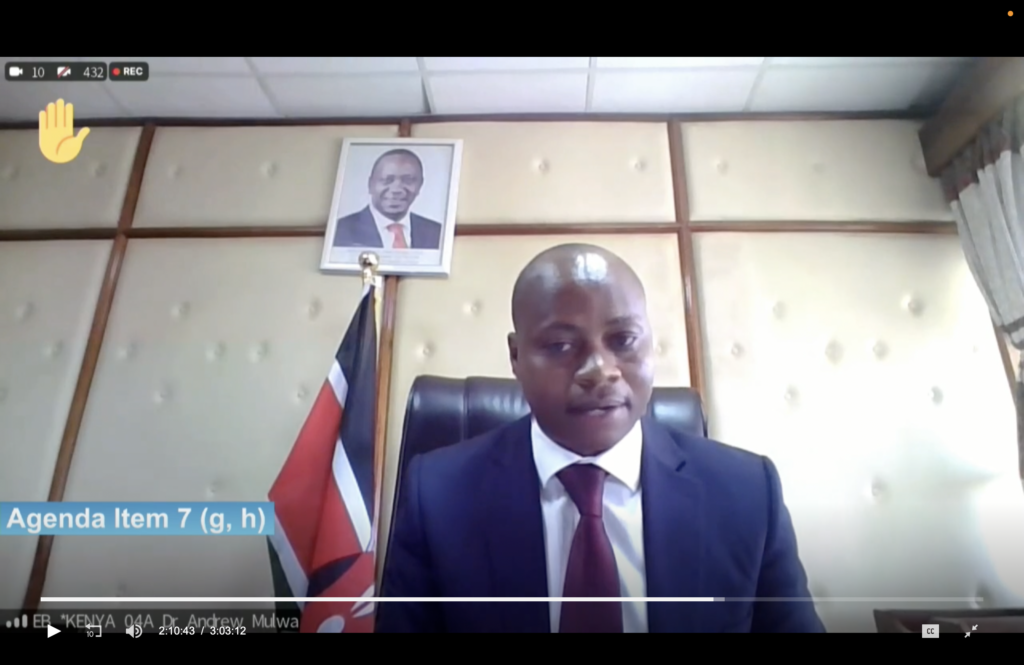
The alcohol policy agenda item (also known as ‘Annex’ in reporting documents) was allocated under item 7 of EB150 on the political declaration of the third high-level meeting of the UN General Assembly on the prevention and control of NCDs, together with no less than 9 other sub-items. In Annex 8, Appendix 1 the draft global alcohol action plan document was discussed in the third and last topical grouping together with the “Draft intersectoral global action plan on epilepsy and other neurological disorders.”
All in all 27 statements were made by Member States discussing alcohol policy in general and the global alcohol action plan in particular, with Member States from all WHO regions contributing their perspectives to the debate.
Considering that the NCDs agenda item had ten sub-items for discussion, the high number of alcohol policy-related statements stands out and underlines the importance Member States assign to alcohol harm as a public health priority.
The extensive discussion further highlighted strong and broad support among countries for accelerated alcohol policy action.
United Arab Emirates (UAE)
The United Arab Emirates, EB Member for the WHO Eastern Mediterranean Region (EMRO), kicked off the discussion by citing the EMRO consultation process on the draft action plan. The UAE highlighted the return on investment from the three alcohol policy best buys and said that especially due to the impact of COVID-19 on mental health and alcohol use problems, more coordinated action for alcohol policy development was needed.
France for the European Union countries
As EU Presidency country, France took the floor to speak on behalf of the EU Members States and partner countries. France reminded of the EU co-sponsoring the decision at EB146 and expressed satisfaction with the two-year consultation process that ensured, to develop the draft action plan.
Alcohol policy, especially in the context of beating cancer, is a priority for the EU.
France addressed the importance of focusing more on capacity building and technical assistance for WHO Member States regarding the alcohol policy best buy solutions, especially alcohol taxation and marketing regulation.
The EU countries also requested the WHO Secretariat to draft a specific document for guidance on governments’ interaction with the alcohol industry, to avoid conflicts of interest and safeguard public health in alcohol policy making.
In the statement, France underlined the importance of discussing action plan implementation in regular intervals at the WHO governing body meetings.
Denmark for the NB8
As EB member, Denmark took the floor on behalf of the Nordic and Baltic countries (NB8, Iceland, Norway, Sweden, Finland, Denmark, Estonia, Lithuania, Latvia). They also expressed strong support for the action plan, for example addressing the link between alcohol and poverty and stating that alcohol’s social and economic harm, were a high priority. The NB8 welcome the equity based approach advanced by the action plan and endorsed the bold targets.
Denmark underlined the importance of maintaining focus on science- and evidence-based measures and the goal to work towards population-level alcohol use reduction, and all alcohol harms. The NB8 welcomed the flexibility for countries that the action plan provided.
Kenya for the African Union
As EB Member, Kenya was next to take the floor and spoke on behalf of the African Union Member States. They congratulated WHO on the development of the action plan and expressed concern about “uneven” implementation of the WHO Global Alcohol Strategy – a problem affecting the African region.
Kenya explained that the African region had not seen a decrease in alcohol use, as the targets in the SDGs require, but instead an increase in alcohol consumption and related harm.
The AU countries expressed urgent need for greater WHO support in developing effective policies with attention to specific African alcohol problems:
- Informal alcohol,
- Youth alcohol use, and
- Alcohol industry interference against effective alcohol policy solutions.
Kenya also underlined the importance of biannual reporting at the WHO governing bodies about the implementation of the action plan and recommended adoption of the plan.
Colombia
Next, Colombia as EB member for the Americas took the floor and recommended adoption of the action plan and thanked WHO, Member States and civil society for developing the draft action plan.
Colombia is working to improve their national response to alcohol harm, to reduce alcohol use, taking into account specific risk factors driving alcohol use and harm. The country focuses on alcohol use and related harm in children and young people.
Colombia also addressed the need to adopt specific steps for protection of communities from alcohol harm.
The priority actions were alcohol prices through taxation, alcohol marketing regulation, reducing alcohol outlets, and improving monitoring and evaluation of these measures.
Republic of Korea
As EB member for the WHO Western Pacific Region (WPRO), the Republic of Korea took the floor expressing strong support for the action plan.
The domestic work on alcohol policy development was aligned with the action plan and the WHO SAFER initiative. In 2020, the country amended the National Health Promotion Act, further restricting alcohol availability and alcohol advertising.
Korea highlighted the challenge of digital alcohol marketing.
United Kingdom of Great Britain and Northern Ireland (UK)
The UK, EB member from the WHO European region, was the first country to take the floor and deliver a pro-alcohol industry statement.
While the country welcomed the action plan, including the target for a 20% reduction of per capita alcohol use, it focused on the alcohol industry, without addressing conflicts of interest concerns. The UK welcomed the measures included in the plan for the alcohol industry, as well as the mentioning of no- and low-alcohol products as a solution to reduce and prevent alcohol harm.
The UK also talked about a clear role for collaboration with the alcohol industry.
The country reminded listeners of the UK’s effort for “comprehensive reform” of the alcohol duty, planned to be introduced in February 2023.
The UK expressed acceptance for the action plan as is.
Argentina
Next came Argentina, as EB member for the WHO Americas region.
Argentina welcomed the extensive process for developing the draft action plan. They emphasized that alcohol was a serious public health problem in the country and region, especially among children and youth, and considering the increase in alcohol use among women.
Argentina said a multi-sectoral approach to alcohol policy development was needed, for example with regard to policy coherence between public health and trade.
Argentina called for better provision of technical support for alcohol policy development to Member States by WHO. They expressed support for the adoption of the action plan.
Japan
As another EB member from the WPRO region, Japan took the floor next, addressing the alcohol action plan.
During COVID-19 the country saw a reduction in alcohol availability, due to coronavirus counter-measures. But now, concerns have emerged in Japan about increasing home alcohol consumption. Thus, Japan requested the WHO to look into alcohol harm during health crises and to provide advice on alcohol during health crisis.
Japan expressed an expectation for WHO leadership on alcohol policy and multisectoral action.
Slovenia
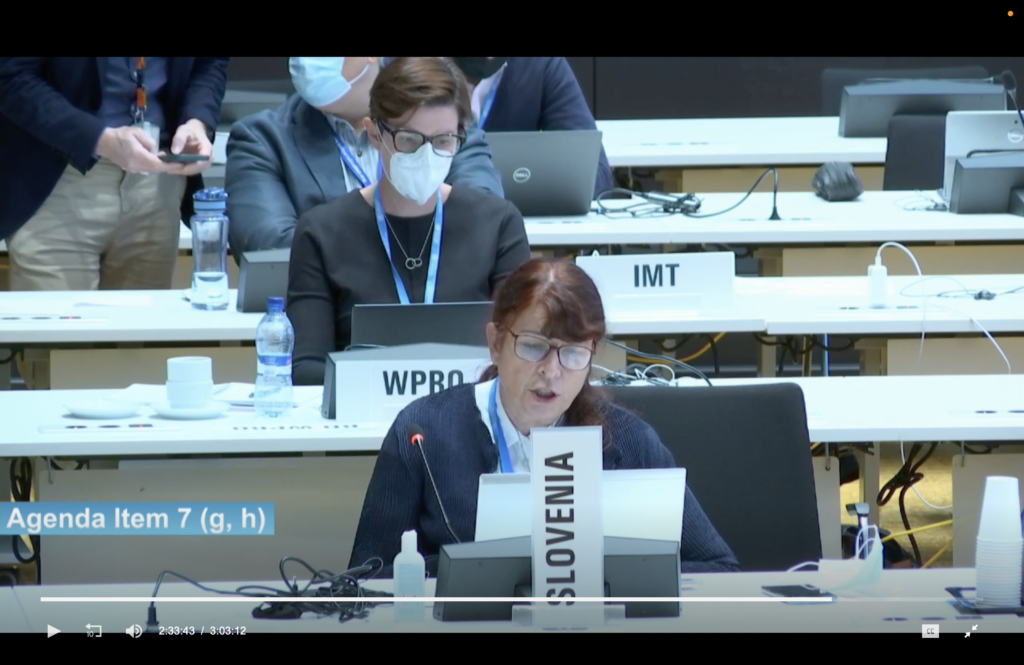
Slovenia, which had recently been EU Presidency country, took the floor next, as another EB member from the WHO European region.
Slovenia addressed the fact that alcohol remains the only addictive substance with a huge global health burden that is not under any international control. While there is broad and increasing support for a legally binding treaty on alcohol, Slovenia acknowledged the controversial nature of the question and a lack of consensus and thus called for a feasibility study into the possibilities of international instruments for alcohol control.
Slovenia also spoke about the evidence showing there was no safe level of alcohol use. It highlighted the growing momentum for alcohol policy as a public health priority, since the high-level side event during the UN General Assembly in 2018, in New York.
Slovenia expressed support for advancing the alcohol policy best buys and said that the action plan empower all WHO levels to support Member States in the development of alcohol policy solutions. It welcomed the WHO Europe regional effort to develop a new alcohol policy framework.
Slovenia also called for a guidance document on how to protect alcohol policy development from alcohol industry interference.
Slovenia expressed support for the target of a 20% reduction of per capita alcohol use and underlined the need to strengthen the SAFER initiative and to improve global governance for alcohol policy, such as through the global network of alcohol policy focal points and a ministerial conference on alcohol policy.
Slovenia said it supported the adoption of the action plan.
Russian Federation
Russia took the floor next, as another EB member form the WHO European region. It began by expressing support for the action plan, recommending adoption and implementation of the plan.
Alcohol policy was a priority in Russia:
- Minimum unit pricing,
- Reducing alcohol marketing,
- Reducing alcohol sales, and
- Tackling illegal alcohol trading are all priority areas where Russia took comprehensive action to achieve significant reduction in alcohol-related deaths and diseases.
Russia was a leader in the area of alcohol policy and would be willing to share its experience with other countries.
Russia also highlighted the importance of integrating alcohol policy in the response to prevent and reduce NCDs overall.
Belgium
As non-EB member Belgium took the floor, expressing support for the EU’s statement, delivered by France. Belgium expressed concern about the role of the alcohol industry in the action plan. This statement indicated possible issues with interpretation of the French statement on behalf of the EU.
Belgium delivered a strong statement on conflict of interest concerns regarding the role of the alcohol industry in the action plan and the importance of FENSA being strictly followed. National alcohol policy must be protected from alcohol industry interference.
Belgium closed by calling for a stand alone document with specific guidance for Member States “IF” they need to engage wit the alcohol industry.
Thailand
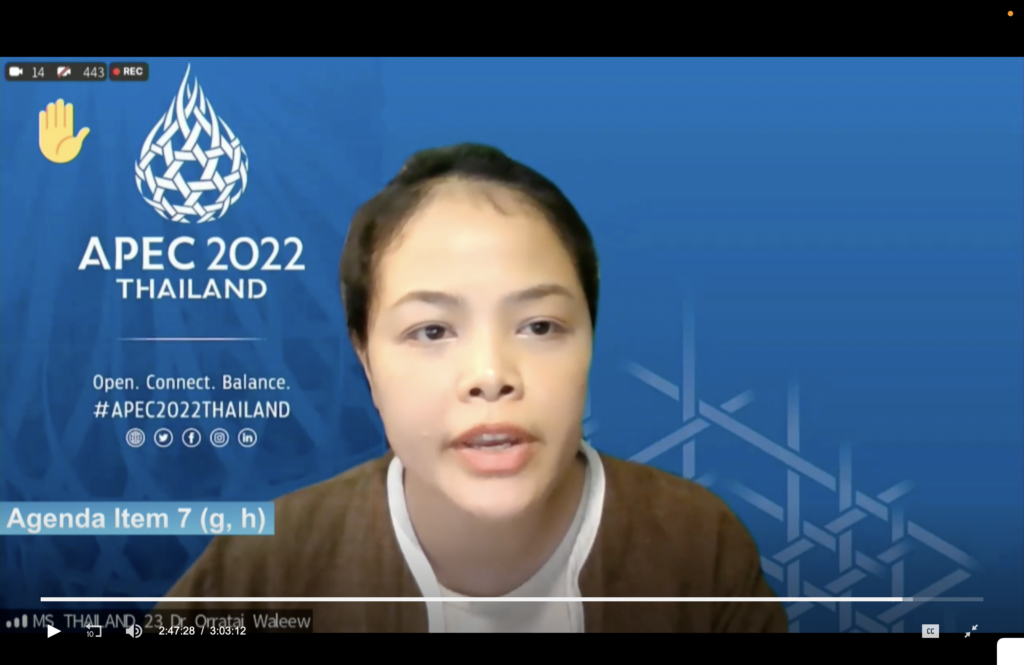
The discussion moved to a South-East Asian perspective, with Thailand taking the floor. The country is not an EB member but was a co-sponsor of the EB146 decision to develop the draft alcohol action plan.
Thailand spoke about the evidence showing that alcohol kills, including people who have not even consumed alcohol themselves. Thailand also noted the lack of international regulation of alcohol.
The country expressed support for the WHO SAFER Initiative and called for accelerated support to implement the SAFER technical package.
Thailand gave voice of conflict of interest concerns, regarding alcohol industry interference against WHO-recommended alcohol policy solutions. Thailand concluded their statement by emphasizing that WHO should promote collaboration on alcohol policy across the organization and on all levels to tackle cross-border alcohol marketing issues.
Norway
The country began by expressing support for the action plan. Norway implemented a comprehensive, public health oriented alcohol policy system with the result of having among the lowest alcohol consumption rates in the European region.
Norway expressed support for the SAFER Initiative and the need to reduce overall alcohol use.
Also Norway called for the need of a stand alone document with guidance for Member States “IF” they were to engage with the alcohol industry to advance and protect public health interests.
Indonesia
Indonesia took the floor to talk about their domestic efforts to prevent and reduce alcohol harm. The country was developing an alcohol labeling regulation.
China
China took the floor to express support for the statement delivered by the Russian Federation. This meant another strong support for evidence-based action on alcohol as public health priority.
Philippines
The Philippines took the floor to outline their commitment to alcohol policy development. The country raised alcohol taxes and thus funds universal health coverage and the increase of the legal age limit for alcohol purchase was another evidence-based solution to prevent and reduce alcohol harm in the Philippines.
Canada
Canada took the floor and expressed agreement with the analysis that implementation of the WHO Global Alcohol Strategy was slow.
Canada then commented on the overall issue of agenda management concerning item 7 on NCDs. It was challenging to consider the implications of new strategies or action plans when discussing them in bulk. Canada expressed the need to ensuring more meaningful discussions in the future.
United States of America (U.S.)
Another non-EB member took the floor in the U.S.
The U.S. said it recognized the health, social, and economic harms caused by alcohol. It agreed with the global targets and supported many action areas as a menu of options.
However, in another alcohol industry-friendly statement, the U.S. expressed concern about the action plan’s proposal for WHO to engage in the trade policy area. The U.S. also expressed concern about the way the action plan addresses alcohol labeling.
The U.S. concluded by expressing a wish to “further refine” the action plan through “intersessional work”.
Brazil
Brazil took the floor to say that the draft action plan was in line with the alcohol policy approach in Brazil.
The country was concerned about the high costs due to alcohol. As response, it implements some alcohol policy solutions, such as measures against driving under the influence of alcohol.
Brazil expressed concerns that the newest modifications to the draft action plan could not be discussed internally and wanted more time to do so.
Ecuador
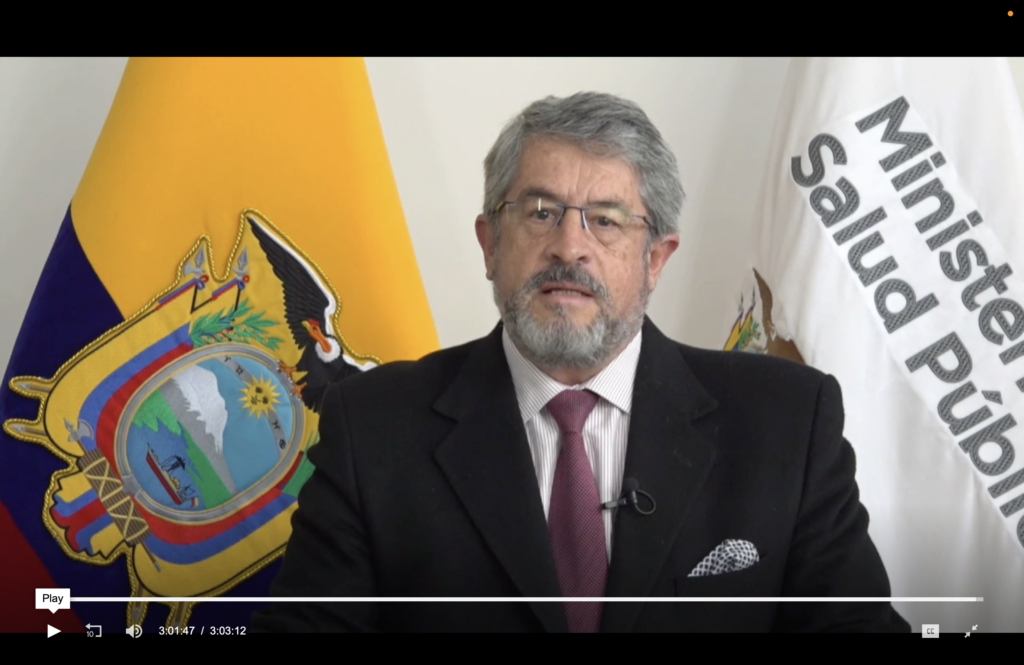
Ecuador expressed support for the action plan. It would be helpful to reduce alcohol harm.
Nevertheless, Ecuador emphasized that the action plan could go further: it still gives the alcohol industry a role; Ecuador also expressed concern about the alcohol industry interaction with WHO.
Ecuador underlined that Member States needed to step up action to reach the goals related to reduction of alcohol consumption and harm.
A follow-up mechanism to assess the progress made was necessary to be set up.
Ecuador highlighted the Framework Convention on Tobacco Control (FCTC) as a model for alcohol control and expressed interest in collaboration on advancing alcohol policy solutions.
Uruguay
Uruguay participated in the consultation process and agreed with the action contained in the action plan. It underlined the urgency for accelerating action on alcohol and therefore supported bigger ambitions contained in the action plan.
In the country, especially youth alcohol use was a major concern. Uruguay was committed to following the SAFER initiative.
Uruguay expressed the need for clear guidelines on alcohol policy and called for better support from the WHO Secretariat. Uruguay stressed the need for consistent language in all WHO documents. It emphasized there was no safe level of alcohol use.
The country noted the existence of barriers to alcohol policy development and the importance of taking COVID-19 into account, as well as the impact of new technologies on alcohol use levels.
Uruguay also requested WHO guidelines on how to avoid and handle conflict of interest issues.
The need for better financing for the “fight against NCDs” was another point that Uruguay raised.
Uruguay also talked about the importance of mainstreaming alcohol policy considerations in the trade agenda, and other bodies, such as CODEX: health authorities needed to participate and coordinate their contributions there.
Namibia
Namibia thanked the Secretariat for a good report. With the help of the WHO, Namibia had made “great strides” in reducing alcohol harm. The country developed a draft national alcohol policy, and improved eduction about alcohol harm, as well as its work with treatment of alcohol use disorder and addiction.
Namibia remained committed to work with Member States, the WHO Secretariat, and Non-State Actors for advancing alcohol policy.
Namibia noted that the WHO Global Alcohol Strategy was the only policy framework to reduce alcohol harm and thus encouraged the WHO Secretariat to address implementation challenges.
Australia
Australia expressed support for the intent of the draft action plan. It welcomed the whole-of-government, whole of society, and multi-sectoral approach to alcohol policy development and implementation.
Australia also noted the flexibility provided for Member States by the draft action plan. And the country welcomed the relevant and measurable targets and indicators.
Mexico
Mexico expressed tis gratitude to the Secretariat for the extensive process of consultation in developing the alcohol action plan. The documented reflected a balance between all opinions. Therefore, Mexico supported adoption of the action plan.
Mexico underlined that it is the Member States that have prime responsibility for designing alcohol policy solutions. But WHO guidance was critical to achieve public health goals.
Mexico also expressed support for SAFER and its commitment to SAFER implementation.
Jamaica
The country was committed to reducing alcohol harm and thus launched the national policy to reduce alcohol harm to achieve the country’s Vision 2030.
Jamaica supported adoption of the decision.
South Africa
The burden of alcohol was unacceptably high, said South Africa in their EB150 statement on the draft alcohol action plan. Reducing alcohol harm would help achieve the Sustainable Development Goals.
South Africa talked about the negative impact of alcohol on the health system, for instance through road safety injuries and fatalities and violence.
South Africa emphasized that alcohol policy action at global level came at a critical time as COVID-19 has put renewed focus on alcohol harm: Availability, marketing, and pricing of alcohol matter.
In this context, South Africa called for a “new normal”.
It also requested WHO guidelines for alcohol industry engagement.
Civil society statements
After 90 minutes of interventions from WHO Member States – 11 member of the Executive Board and 16 statements from non-EB members – came the time for civil society to share their perspectives.
Specifically on the alcohol policy-related discussion of grouping 3 under the NCDs agenda item, three Non-State Actors in official relations with WHO delivered statements: Movendi International, World Cancer Research Fund International (WCRFI) and the Union for International Cancer Control (UICC), and the World Heart Federation.
WCRFI and UICC
World Cancer Research Fund International and UICC expressed support for Movendi International’s statement. They commended the Action Plan’s more ambitious targets, but expressed concern about the role of the alcohol industry in every action area, which would perpetuate the harms industry caused. They also expressed concern about the misuse of “harmful use of alcohol” terminology. Evidence clearly showed there was no safe level of alcohol consumption for cancer risk.
World Heart Federation
The World Heart Federation applauded the efforts of the Secretariat and Member States to address alcohol harm as global health challenge. They said the evidence was clear: any level of alcohol consumption could lead to loss of healthy life.
Even small amounts of alcohol can increase the risk of CVD, and contrary to popular belief, no reliable correlation has been found between moderate consumption and a lower risk of heart disease.”
Kelcey Clara Armstrong-Walenczak, World Heart Federation
The World Heart Federation pointed to their new policy brief, summarizing this evidence, breaking down the “harm/benefit” debate, and presenting recommendations to counter the deadly impact of alcohol, including:
- Strengthening restrictions on availability,
- Advancing driving under the influence of alcohol countermeasures,
- Facilitating access to screening, brief interventions, and treatment,
- Enforcing bans on advertising,
- Raising prices through excise taxes,
- Promoting intersectoral policies to discourage alcohol uptake, especially in young people,
- Establishing a uniform minimum legal alcohol consumption age, and
- Mandating prominent health warnings on labels.
Movendi International
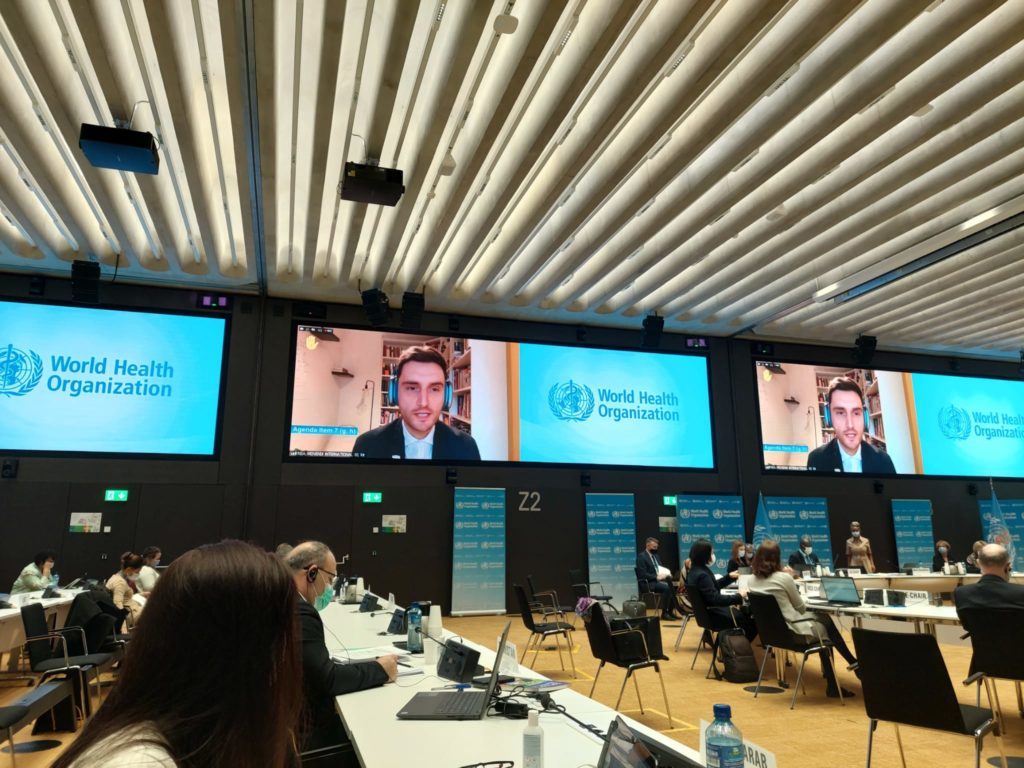
Movendi International welcomed and endorsed the draft WHO Global Alcohol Action Plan. They called on Member States and the Secretariat to:
- Resource implementation of the action plan,
- Ensure biannual review of implementation at the governing bodies,
- Launch an inter-agency initiative for public health alcohol taxes, and
- Tackle cross-border alcohol marketing problems.
Movendi International also expressed remaining concerns about elements in the action plan:
- The role of the alcohol industry,
- The WHO dialogue with the alcohol industry, and
- The concept of “harmful use of alcohol”.
Movendi International said these shortcomings might hinder urgently needed action to protect people from the harms caused by the alcohol industry.
At the same time, we welcome key elements: more ambitious targets, focus on the alcohol policy best buys and SAFER, and improvements of the alcohol policy infrastructure at all levels.
Maik Dünnbier, Movendi International
It’s time to accelerate action on alcohol as public health priority.”
Movendi International statement
Movendi International made a statement on the global alcohol action plan.
The full statement can be read here. The statement as delivered in a shorter version is here.

Highlights of the debate and key themes for the way forward
The sheer number of statements during the debate and the even bigger number of Member States behind those statements was remarkable. Eleven Executive Board members made statements and 16 non-members contributed to the debate.
- 3 statements from the WHO African region, and
- 55 countries of the African Union were represented.
- 1 statement from the WHO Eastern Mediterranean region.
- 2 statements from the WHO South-East Asia region.
- 7 statements from the WHO European region, and
- 27 European Union countries plus three,
- All 8 Nordic and Baltic countries, and
- Russia and the UK were represented in the debate.
- 9 statements from the WHO Americas region, and
- Countries from North, Latin America as well as the Caribbean were represented.
- 6 statements from the WHO Western Pacific region, and
- High- and low- and middle income countries taking part in the debate.
Overall, five key themes emerged from all these statements representing national priorities, concerns, and contexts:
- Broad and strong support for an ambitious action, including ambitious goals and targets.
- Priority attention to the most cost-effective, evidence-based alcohol policy solutions, the best buys and the SAFER technical package.
- Unequivocal calls for WHO investment in technical support and capacity building for Member States to facilitate greater country impact.
- Emphasis of the importance of governance and infrastructure improvements for alcohol policy on all levels.
- Serious concerns about alcohol industry interference, WHO’s ability to implement FENSA properly, and the need to develop technical guidance for Member States on how to avoid, or safeguard against potential conflicts of interest and industry interference in public health alcohol policy making.
In their reaction to the discussion by Member States and civil society, the WHO Secretariat picked up some of these key themes from the debate.
The WHO Secretariat echoed the debate regarding the complexity of the issue and the need to move forward through a multisectoral approach. The Secretariat reiterated that the WHO Global Alcohol Strategy would set the boundaries for the implementation of the action plan.
In linking to other agenda items of EB150, the Secretariat acknowledged that COVID-19 had disrupted mental health and substance use services.
The Secretariat specifically noted three themes for the way forward, underlining the need for support from Member States to move forward on them:
- The stand alone document with guidance for Member States if they need to engage with the alcohol industry.
- The need to strengthen governance, for example through the international focal point network and the ministerial conference on alcohol policy.
- The necessity of tailoring support for Member States in the African region.
The Secretariat indicated openness to continue the dialogue about the action plan with Member States after the Executive Board and leading up to the World Health Assembly. What this means concretely is not yet clear, as WHO works to define the next steps.
For the public health goal to accelerate action on alcohol this means that more work needs to be done to ensure adoption of an ambitious, comprehensive, and fit-for-purpose global alcohol action plan.
Movendi International welcomed the EB150 decision.


